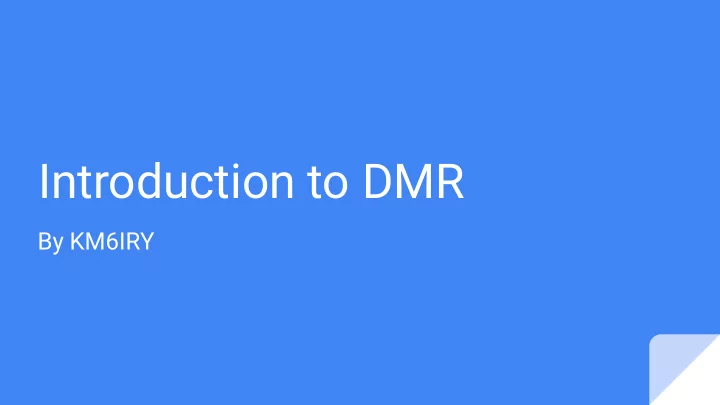

Introduction to DMR By KM6IRY
What is Digital Mobile Radio (DMR)?
A standard established by ETSI An European Telecommunications Standards Institute (ETSI) published worldwide standard to help reduce RF congestion. Uses 12.5 kHz channel width Time Division Multiple Access (TDMA) Effectively 6.25 kHz per channel
DMR Tiers Tier 1 (Unlicensed) - 2005 Tier 3 (Trunked) - 2012 ● FDMA, Consumer applications, .5 watt ● 2-slot TDMA ● dPMR (446 MHz European unlicensed ● Multi-channel, Multi-Site service) Tier 2 (Conventional) - 2005 ● 2-slot TDMA ● IP Connected
Two Repeaters in One
Spectrum Efficient Two 6.25 KHz repeaters (like D-Star) need Guard Bands between them if f c - 6.25 f c f c + 6.25 f c – 11.25 f c f c + 11.25 located near each other to co-exist without interference, thus taking more spectrum! The actual FCC emission designator Guard Band No Guard Band for DMR is 7K6 or 7.6 KHz Bandwidth. as large as 10 kHz between 2 between channels channels Total BW= 22.5 kHz Total BW= 12.5 kHz
Better Signal Quality ● No hiss, popping, or static ● Better RF range than older digital technologies ● Forward Error Correction and Cyclic Redundancy Check coders
Better Battery Efficiency For each hour of usage the TDMA 40 percent improvement in talk radios show between 19% and time in comparison with analog 34% less battery capacity is radios required than for the FDMA models. http://dmrassociation.org
Timeslots & Talkgroups World Wide National US Regional Time Slot 1 Time Slot 2 Regional Sub-Regional/Statewides Repeater
Questions?
Recommend
More recommend